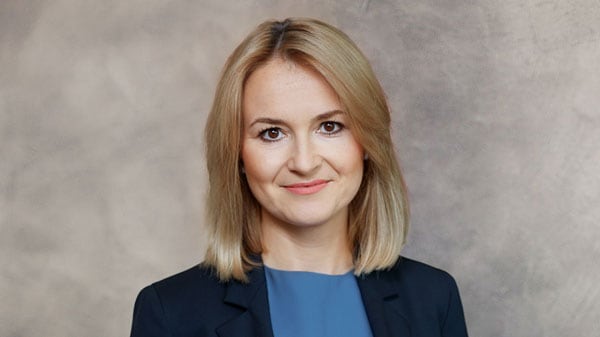ATB Corporation at a Time of War
The ATB chain has always been an innovator in food retail, before becoming a true pillar of food security for the country. ATB stores are the first to return to deoccupied territories, launching monumental projects to deliver food and essential goods needed to support the local communities in Ukraine's newly liberated and front-line locations.
The full-scale war made Ukrainian businesses review their business processes, and the ATB network was no exception, rather the opposite; it demonstrated a comprehensive approach to adapting to the new conditions and the ability to rapidly transform its considerably sized business.
Read on to find out more about the key takeaways from the discussion between Olena Volkova, PwC Ukraine Partner, and Borys Markov, Chairman of the Board and General Director of ATB Corporation.

Borys Markov
ATB Corporation
Chairman of the Board,
General Director

Olena Volkova
PwC Ukraine
Partner
Borys, ATB Corporation demonstrated incredibly well-coordinated teamwork during the full-scale war, becoming an example of seamless adaptation to wartime challenges. In your opinion, what made such a performance possible?
“We had no moral right to not prepare when close to 4 million Ukrainians pass through our stores daily”
Back in the day, ATB found itself best prepared for the global coronavirus pandemic thanks to its traditional dynamic growth strategy and the ability to transform under extreme time pressure.
The company became a spectacular example of business resilience and perseverance even in a time of war. Our team understood that we quite simply had no moral right to not prepare, being the largest retail chain in the country with the presence in the greatest number of locations. Close to 4 million Ukrainians pass through our stores daily.
We had a range of scenarios developed covering even the most severe outcomes, such as the occupation of the entire Right-Bank Ukraine. Fortunately, these were not needed. However, they played their role in helping us with thorough preparation; we developed action plans for a quick response to any force majeure events.
And obviously, it was impossible to be fully prepared. In 2014, we had already dealt with responding to the annexation of Crimea and the occupation of the Donetsk and Luhansk Regions, so we knew what to focus on first. All the necessary skills are still with us since those times.
So the tragic 2014 events became a good life lesson?
“For most decisions, we have cut the decision-making time to hours”
Yes, and the sad truth is that we had to learn multiple lessons like that. Remote work - another management tool that we learned during the Coronavirus crisis - also proved handy. At the moment, online collaboration skills prove to be effective daily, providing additional opportunities to enable quick responses and rapid decision-making.
Among the changes triggered by wartime conditions is a dramatic increase in the speed of decision-making. Powers were delegated from the company shareholders to the board, cascading down the authority chain. Such optimization has taken the consideration and decision-making times from weeks to hours for certain (even critical!) decisions.
Except for the preparation, what other business processes did you have to reengineer?
“Our stores become community resilience hubs of sorts”
We had to revise our approaches to energy efficiency and energy saving. To ensure uninterrupted work during lengthy blackouts caused by missile strikes on energy infrastructure, we quickly equipped the stores with powerful generators. In particular, after the mass attacks on energy infrastructure in December 2022, over 1000 stores in our chain were equipped with power generators, and the connectivity was powered through Starlink. This enabled the stores to operate without interruptions and to become community resilience hubs of sorts.
Ultimately, the war affected our HR policy as well. Many people had to leave their homes in the occupied territories and relocate to safer locations. It goes without saying that in our recruitment, before drawing from the talent pool in the job market, we prioritized employees from our chain who had lost the ability to work in their hometowns due to the war. While any learning and development programs were suspended in the early days of the war, starting in the autumn of 2022 we resumed training our people. When a territory is liberated and we need to quickly open a store, trained personnel is not always readily available, and so we had to rapidly adapt all our programs to the new wartime normal.
For example, we opened our first store in the deoccupied Kherson in November 2022. Managing this asset under these conditions required new specialized knowledge and skills, such as crisis management and emergency response skills. The city had no electricity or water mains at the time. We had to make a backup power supply available to enable our customers to pay by either cash or card. In addition, the enemy's shelling never ceased, so sheltering and evacuating people during air raid alerts remained a critical priority. It is a new experience that we would rather not have.
Businesses are now rethinking their value to become more resilient and agile. One could say that we will definitely never be our pre-war selves ever again. A perspective on safety has changed, including food security for the wider society. Despite the tremendous loss of assets, destroyed stores, and distribution hubs, lost personnel, disrupted core logistical chains, and other factors, ATB Corporation has become the pillar of the country’s food security and provides systemic support to the Armed Forces, healthcare facilities, volunteer military formations, and organizations, etc. The total donations have exceeded UAH 500 million.
To what extent, in your opinion, are long-term transformation plans feasible in the current Ukrainian reality?
“It was ATB who introduced a self-service store format to the Ukrainian public many years ago”
Any type of business requires a comprehensive approach to transformation, encompassing the implementation of innovative solutions, staff development and training, and mastering effective and efficient tools. Retail is no exception to this rule. This is a field with a dynamic structure, which needs to develop, to find the most effective and efficient solutions promptly, optimize business processes, and improve its performance.
As regards innovation, ATB is not only a longstanding leader in this respect but also drives the national retail industry. The vast majority of what is currently a normal feature of any supermarket across the country has been tested, implemented, and, in some cases, developed by ATB employees at some point.
For example, during the Coronavirus crisis, we launched the Supplier Portal, a digital platform designed to simplify interactions with suppliers to ensure uninterrupted supplies of fresh food and quality goods to Ukrainian consumers. Following the full-scale invasion, we improved and expanded the functionalities of the portal.
One could say that it was ATB who introduced a self-service store format to the Ukrainian public many years ago. We even launched our variation of this format — a discounter. This is a convenient self-service store with a wide range (over 3.5 thousand items) of reliable fresh food products and quality basic consumer goods at a fair price.
Do you agree that strategic growth is underpinned by transformation processes? What is ATB Corporation's current strategy?
“ATB stores were among the first to resume operations in the liberated areas, which helped prevent a humanitarian disaster”
In fact, building a resilient, sustainable, transparent, and patriotic business is a strategic process. And as such, any transformations effectively drive future growth.
Our dynamic growth strategy is based on the systematic expansion of the retail network. While we actively worked on growing the number of our stores pre-war, mostly in the Southern and Central regions, today we focus on the Western regions that have become a hub of sorts for displaced individuals.
At the same time, we continue working on recovering the demolished and damaged stores in the liberated areas. ATB stores were among the first to resume operations in the liberated areas of Kyiv, Kharkiv, Chernihiv, Sumy, and Kherson regions, which helped prevent a humanitarian disaster. Today, over 1300 our stores operate across the country.
It is noteworthy that, during the extraordinarily difficult wartime year, ATB paid nearly an extra UAH 1 billion of national and local taxes and charges. The Company accounts for nearly half of the total tax paid by all Ukrainian retailers combined during 2022.
We also actively work with other market players to support the Ukrainian economy. For example, in April, together with major retail chains, we signed an industry memorandum designed to ensure a seamless operation of food supply chains under martial law. The document helps support a large number of Ukrainian food producers and balance their relationships with retailers. We are grateful to our industry peers, as such a step demonstrates how food retail chains are open to uniting to support the country's economy and ensure its food security, even under the challenging martial law conditions.
What are your expectations for the growth of Ukraine’s economy in the upcoming years?
“The full-scale war has proven the power and resilience of the Ukrainian people”
Numerous factors prevent any credible economic growth forecasts for the future years.
Of course, we trust and hope for the most optimistic scenario, which is victory in the near future and the beginning of recovery for multiple economic sectors. Yet, even if this optimistic scenario crystallizes, we will have to look for answers to some very difficult questions. Energy and manufacturing industries will face high-scale recovery and upgrades. This requires significant effort and financial outlay.
Agriculture and several other sectors will, unfortunately, remain hostage to demining efforts for many years to come.
Even if the war stops today, it will take at least a decade to clean the land from explosives. The consequences of the Kakhovka Dam disaster are a separate important and painful topic.
One thing is certain, though: the economy will face difficult challenges and change. We hope that our combined efforts will help reach pre-war performance as promptly as possible and continue moving forward towards the highest European standards of life. We are certainly capable of achieving this ambitious goal, having proven the power and resilience of the Ukrainian people during the war years.
From my side, I hope the Ukrainian Armed Forces will win in the near future and the ATB chain will recover and reach new heights once the war is over.
Thank you. Glory to Ukraine!
ATB Corporation at a Time of War

- Once combat began, the ATB chain was among the few retailers who delivered food to sieged cities. The company relied on its own 750-vehicle-strong fleet, which enabled it to ensure uninterrupted supplies of the essentials when many carriers had suspended their business.
At the beginning of the full-scale war, ATB created a network of ‘backbone’ stores to supply as many essential foods as possible to sieged and front-line locations. Such ‘backbone’ stores operated in Kyiv, Sumy, Cherkasy, Chernihiv, Kharkiv, Mykolaiv, etc. Working with the Ministry of Digital Transformation of Ukraine, the company developed an online map of food stores with opening hours and up-to-date information. The map was updated in real time.
Starting in early 2023, ATB-Market scaled its food and essentials delivery project to deoccupied and front-line Ukrainian locations in the Kherson and Donetsk Regions. As of today, the delivery destinations cover more than 150 locations in the Kharkiv, Donetsk, and Kherson Regions. The location list is continuously updated and expanded.
In March 2022, the domestic market had a shortage of food and essentials supply from local producers. The ATB chain launched in-house direct supplies of foods and essentials from Poland, the Baltic states, and Turkey without the respective labeling of each item in Ukrainian. Government resolution No 234 allowed the retailers to use this pathway to ensure timely supplies of foods and essentials to their shelves as peacetime procedures took quite a long time.
In the spring of 2022, the company launched ATB-Post, a project providing free urgent humanitarian parcel deliveries between cities such as Lviv, Kharkiv, Odesa, and Dnipro for charities and volunteer centers. A total of over 1,000 various humanitarian parcels were delivered as a result.
As missile strikes on Ukrainian cities and towns began, ATB stores with basement premises used those as bomb shelters during air raid alerts. The stores accumulated a sufficient backup of drinking water. The address of the nearest store with a basement was available from the company’s official website.
- To ensure uninterrupted work of ATB stores during lengthy blackouts caused by missile strikes on energy infrastructure, a decision was made to equip the stores with powerful generators. In particular, after the mass attacks on energy infrastructure in December 2022, over 1000 stores in the ATB chain were equipped with power generators, and the connectivity was powered through Starlink. This enabled the stores to operate without interruptions and to become community resilience hubs of sorts.
- Starting from late February to early March of 2022, ATB Corporation offered its customers an opportunity to withdraw cash from the till at its stores. Customers could withdraw up to UAH 6 thousand in cash from their card issued by any bank if they paid for their shopping by card for any amount. This offer remains valid to this day.
In the summer of 2022, ATB Corporation implemented BRAITY, a nationwide patriotic charitable augmented reality project. The project aimed to raise cash to build The Unbreakable in Lviv, the first nationwide rehabilitation center for treatment and recovery of children with explosion injuries. The project raised UAH 20 million, becoming the most successful loyalty program operated by the company to date, both by scale and by the number of like-minded individuals it brought together.
To commemorate the anniversary of the full-scale invasion, ATB-Market launched a charitable project designed to help the Ukrainian Armed Forces and the hospitals save the lives of our defenders. Starting on 24 February, each Ukrainian could make a personal contribution to the victory by purchasing special sticker certificates with Ukrainian resistance symbols at ATB stores. The campaign raised UAH 70 million, with half of this amount donated by the company itself.
From the beginning of the full-scale war, ATB launched a charitable campaign to support the Armed Forces, volunteer military formations, hospitals, affected residents of liberated territories, etc., which was unprecedented on many levels. The total amount of aid provided by the company under martial law approximates UAH 500 million.
Despite the severe losses of assets and capacities resulting from the full-scale war, the company acts as a reliable helper of the Ukrainian military and people, remaining the industry's largest taxpayer. In particular, the corporation’s flagship business, ATB-Market chain, paid UAH 15.63 billion in taxes and charges during 2022 (including UAH 10.11 billion of tax paid to the state budget, UAH 3.63 billion of tax paid to local budgets and UAH 1.89 billion paid to special purpose funds).
Contact us







